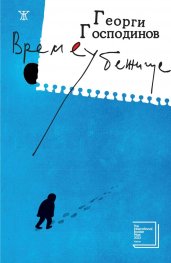“Времеубежище” / “Timeshelter”
 “>
“>
Autor:
Georgi Gospodinov
Country:
Bulgaria (BG)
Book Theme:
Contemporary writers of your country
Publisher:
Janet-45
Publishing Year:
2020
His first novel, Natural Novel (1999), received a Special Award at the National Competition “Development” for a contemporary Bulgarian novel. The novel was published in Serbian, French and was widely praised by the French-language press. Livres-Hebdo (Paris) described it as “simultaneously funny and erudite, vulgar and refined, but brilliant in every respect and innovative in form”. The novel was published in Macedonian in 2003.
Gospodinov is the author (in co-authorship) of the books-mystifications: “Bulgarian Christomatia” and “Bulgarian Anthology”. He participated in international literary readings with famous authors.
National Award for Children’s and Young People’s
Abstract
A mysterious therapist, Gaustine, founds a clinic that treats patients with Alzheimer’s by recreating the pasts in which they felt most secure. The “past-clinic” begins with different rooms and floors, decorated with a completist’s precision and an obsessive’s eye for detail. Decade by decade, therapeutic time-shelters allow patients to inhabit their temporal “safe spaces”. Some patients have memories that are better left untapped: in one harrowing case, Gaustine treats a woman who cannot bear to be near showers. He discovers that she is a Holocaust survivor, prompting him to reflect that memory is not a good in itself, and that the right kind of forgetting is also therapeutically necessary. Gaustine writes that the more past there is, the less memory we have. Differentiating the past from memory becomes important later in the novel, when Gaustine’s idea is hijacked – as it was always going to be – by politicians.The clinic is so successful that clients with no ailments gravitate towards it. Everyone wants a piece of the past. A radio station plays entire days from specific decades. Gaustine imagines towns and cities fixed in particular eras; soon, whole countries want to emulate his idea. Across Europe, political parties promote different decades in their national histories. Referendums are fought on what particular past a country’s future will look like. It’s funny and absurd, but it’s also frightening, because even as Gospodinov plays with the idea as fiction, the reader begins to recognise something rather closer to home.
In 2023, the English translation of the novel was awarded the International Booker Prize. Leïla Slimani, the chairwoman of the judging panel, described the novel as “a brilliant novel, full of irony and melancholy.”



